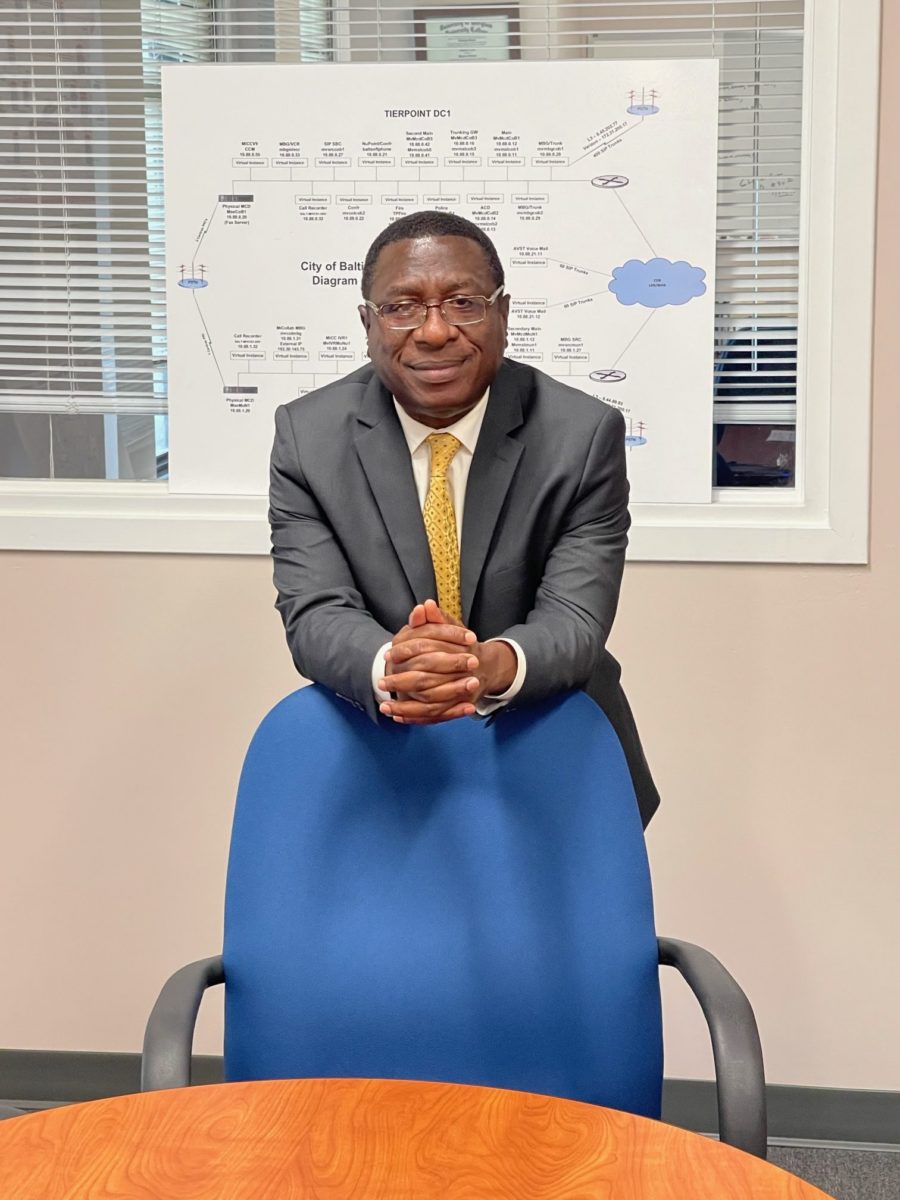When it comes to career journeys, it’s not always where you thought you’d be that matters. It’s where you land.
Simon Etta was ten years into a thriving career in telecommunications, a senior engineer managing accounts in five states for Winstar Communications, a telecommunications service provider. Then came the dotcom crash of the early 2000s. Winstar went bankrupt and laid off a little less than half of its staff before shutting its doors in 2001. This roadblock steered Etta towards the public sector, where he felt the job market was more stable.
He joined the City of Baltimore as a telecommunications specialist in 2002, finding a passion as a public servant.
“As I got involved I developed a passion — not only a love for the City but to see the City grow,” said Etta. Like many municipal governments at the time, the Baltimore was behind the private sector when it came to technology, and Etta saw a chance to apply his skills to modernization of the City’s systems.
“I felt it was a call to duty,” he said.
Today, he’s the City’s director of telecommunications. His role is to keep the City’s telecommunications network running 24/7. Whether it be City phone lines, 311 or 911, his goal is to make sure voice communications and call centers stay functional from a technical standpoint.
“Telecommunications is not just telephones,” said Etta. It’s a branch of information technology, just like programming or hardware maintenance.
“Telecommunications is an application and within that application you can do a whole lot,” he said.
Initially, he didn’t seek a leadership role. Etta remembers an agreement he reached with former City Comptroller Joan Pratt in 2010, when his predecessor left: “She at the time told me, you do the technical stuff, I’ll do the policy stuff,” he said.
He has since embraced it. He was acting director for five years before moving to the permanent role. Altogether, he has been leading the telecommunications department, which was formerly known as the Municipal Telephone Exchange, for a little over a decade now.
We're building that foundation to be ready for whatever is going to come in.
What’s kept him with the City of Baltimore is the constant state of progression of the City’s telecoms systems. Among the latest signs: The city is wrapping up a five-year effort to convert its phone lines to Voice-over-Internet-Protocol phones from legacy landline telephone systems. The VoIP modernization project allows his department to act as a centralized hub for the city’s telecommunications operations, saving the city $2.4 million in spending on outside contracts.
Replacing legacy systems doesn’t happen overnight. For one, there can be hestitation by leaders to upgrade systems with the latest technology when the old systems appear to be working. It’s an issue we heard Code for Baltimore tech lead Jason Anton raise when discussing civic innovation last year.
From a technical expert’s standpoint, the flaws of legacy technology and benefits to upgrading are very clear. But in many cases, spending decisions aren’t ulimately made by telecommunication specialists or full stack developers. The budget is dictated by leaders that know less about how the call center 311 lines work, and more about what happens when the lines don’t work.
It has led Etta to take a straightforward approach: Leaders may not have technical training, but, “You’ve got to tell them the truth,” he said. “And sometimes the truth involves spending money to upgrade and do some reforms.”
Over time, Etta developed an important skill for a technologist working in a leadership role: Presenting technical topics in lay terms. When he started at city government, he was among the only professionals explaining technical concepts to colleagues who didn’t have technical. Now, Etta can break down an easy-to-digest cost benefit formula. It’s divided into hard savings, or how improvements will reduce costs, and soft savings, or how improvements will increase efficiencies.
Since he arrived in leadership, Etta has taken responsibility and ownership for the city’s telecommunications infrastructure. If something breaks, he’ll take the reins to fix it, and provide the answers and roadmap towards solutions.
Now his department and career is in a place that he didn’t imagine in the early 1990s, when he got started in telecommunications and was coming out of Texas Southern University with a degree in electronic engineering. In what he’d consider the midpoint of his career, Etta is ushering in a new telecoms era for the city of Baltimore.
“You got to have that mindset of innovation at the end of the day,” said Etta. “Because things might change tomorrow. You got to be ready and I think that’s where we are today as a city. We’re building that foundation to be ready for whatever is going to come in.”
Donte Kirby is a 2020-2022 corps member for Report for America, an initiative of The Groundtruth Project that pairs young journalists with local newsrooms. This position is supported by the Robert W. Deutsch Foundation.
This is How I Got Here, a series where we chart the career journeys of technologists. Want to tell your story? Get in touch.
Before you go...
Please consider supporting Technical.ly to keep our independent journalism strong. Unlike most business-focused media outlets, we don’t have a paywall. Instead, we count on your personal and organizational support.
3 ways to support our work:- Contribute to the Journalism Fund. Charitable giving ensures our information remains free and accessible for residents to discover workforce programs and entrepreneurship pathways. This includes philanthropic grants and individual tax-deductible donations from readers like you.
- Use our Preferred Partners. Our directory of vetted providers offers high-quality recommendations for services our readers need, and each referral supports our journalism.
- Use our services. If you need entrepreneurs and tech leaders to buy your services, are seeking technologists to hire or want more professionals to know about your ecosystem, Technical.ly has the biggest and most engaged audience in the mid-Atlantic. We help companies tell their stories and answer big questions to meet and serve our community.
Join our growing Slack community
Join 5,000 tech professionals and entrepreneurs in our community Slack today!

The person charged in the UnitedHealthcare CEO shooting had a ton of tech connections

From rejection to innovation: How I built a tool to beat AI hiring algorithms at their own game

Where are the country’s most vibrant tech and startup communities?



